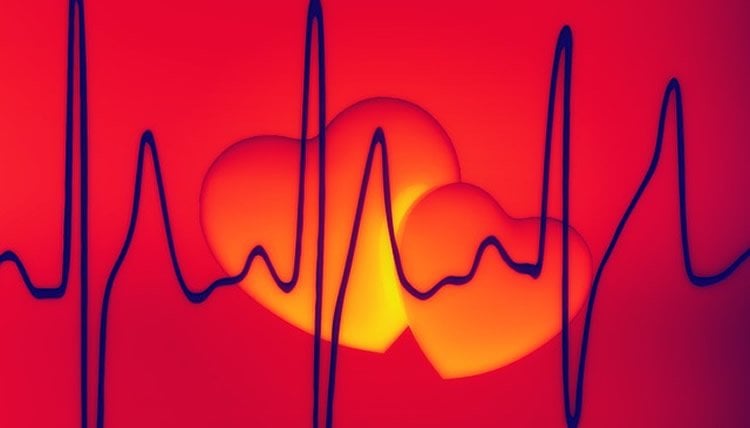A prospective longitudinal study of U.S. Marines suggests that reduced heart rate variability – the changing time interval between heartbeats – may be a contributing risk factor for post-traumatic stress disorder (PTSD). The findings are reported in the September 9 online issue of JAMA Psychiatry by researchers at the University of California, San Diego School of Medicine and Veterans Affairs San Diego Healthcare System.
Even at rest, the normal rhythm of the heart fluctuates, reflecting influences and changes in other parts of the body. Generally speaking, the greater the heart rate variability or HRV, the better. Conversely, reduced HRV suggests poorer functioning of regulatory systems in the body and has been cited as an indicator or predictor for a number of conditions, such as fetal distress, heart disease, depression, asthma, diabetic neuropathy and disorders of the autonomic nervous system, which controls bodily functions not consciously directed, such as heartbeat, breathing and digestion.
HRV has been associated with PTSD, a mental health condition linked to a number of maladies, including anger, insomnia, substance abuse and chronic depression. PTSD is particularly associated with persons deployed to war. For example, the lifetime prevalence in Vietnam-era combat veterans is 19 percent. For veterans of Iraq and Afghanistan, it is 13 to 15 percent. In the general U.S. population, the PTSD prevalence rate is 8 percent.
Researchers investigated whether reduced HRV before combat deployment conferred increased risk of a PTSD diagnosis after deployment. From July 2008 to October 2013, they assessed two large cohorts of active-duty Marines one to two months before combat deployment and again four to six months after their return. After accounting for deployment-related combat exposure, the researchers found that U.S. Marines with reduced HRV prior to deployment displayed increased vulnerability to PTSD upon return.
“The evidence is initial and modest,” said Arpi Minassian, PhD, clinical professor of psychiatry at UC San Diego School of Medicine and first author of the study. “It suggests that an altered state of the autonomic nervous system may contribute to vulnerability and resilience to PTSD, along with known risk factors, such as combat exposure and preexisting stress and trauma symptoms.”

The researchers said that if the findings are buttressed by future studies, it may suggest new opportunities for preventing PTSD by addressing the biology of the autonomic nervous system.
Co-authors include Adam X. Maihofer, Dewleen G. Baker, Caroline M. Nievergelt, Mark A. Geyer, and Victoria B. Risbrough, all at the Center of Excellence for Stress and Mental Health, Veterans Affairs San Diego and UC San Diego.
Funding: TFunding support for this research came, in part, from Veterans Affairs Health Service Research and Development, the U.S. Marine Corps, the U.S. Navy Bureau of Medicine and Surgery, the Naval Medical Research Center’s Advanced Medical Development program, a Biomedical Laboratory Research and Development Veterans Affairs Merit award and National Institutes of Health grants MH093500, MH100351 and P30 DK079337.
Disclosure: Geyer disclosed a financial relationship for NIH Grant MH093500. He received consulting compensation from Omeros.
Source: Scott LeFee – UCSD
Image Credit: The image is in the public domain
Original Research: Full open access research for “Association of Predeployment Heart Rate Variability With Risk of Postdeployment Posttraumatic Stress Disorder in Active-Duty Marines” by Arpi Minassian, PhD; Adam X. Maihofer, MS; Dewleen G. Baker, MD; Caroline M. Nievergelt, PhD; Mark A. Geyer, PhD; and Victoria B. Risbrough, PhD; for the Marine Resiliency Study Team in JAMA Psychiatry. Published online September 9 2015 doi:10.1001/jamapsychiatry.2015.0922
Abstract
Association of Predeployment Heart Rate Variability With Risk of Postdeployment Posttraumatic Stress Disorder in Active-Duty Marines
Importance Disrupted autonomic nervous system functioning as measured by heart rate variability (HRV) has been associated with posttraumatic stress disorder (PTSD). It is not clear, however, whether reduced HRV before trauma exposure contributes to the risk for development of PTSD.
Objective To examine whether HRV before combat deployment is associated with increased risk of a PTSD diagnosis after deployment when accounting for deployment-related combat exposure.
Design, Setting, and Participants Between July 14, 2008, and May 24, 2012, active-duty Marines were assessed 1 to 2 months before a combat deployment and again 4 to 6 months after their return. The first phase of the Marine Resiliency Study (MRS-I) included 1415 male Marines, 59 of whom developed PTSD after deployment. Participants in the second phase of the Marine Resiliency Study (MRS-II) included 745 male Marines, 25 of whom developed PTSD after deployment. Analysis was conducted from November 25, 2013, to April 16, 2015.
Main Outcomes and Measures Predeployment HRV was measured via finger photoplethysmography during a 5-minute period of rest. Frequency-domain measures of HRV were generated. Diagnosis of PTSD was determined using the Clinician-Administered PTSD Scale.
Results After accounting for deployment-related combat exposure, lower HRV before deployment as measured by an increased low-frequency (LF) to high-frequency (HF) ratio of HRV was associated with risk of PTSD diagnosis after deployment (combined MRS-I and MRS-II cohort meta-analysis odds ratio, 1.47; 95% CI, 1.10-1.98; P = .01). The prevalence of postdeployment PTSD was higher in participants with high predeployment LF:HF ratios (15.8% [6 of 38 participants]) compared with participants who did not have high LF:HF ratios (3.7% [78 of 2122 participants]).
Conclusions and Relevance This prospective longitudinal study provides initial and modest evidence that an altered state of autonomic nervous system functioning contributes to PTSD vulnerability, taking into account other key risk factors. If these findings are replicated, interventions that change autonomic nervous system function may open novel opportunities for prevention and treatment of PTSD.
“Association of Predeployment Heart Rate Variability With Risk of Postdeployment Posttraumatic Stress Disorder in Active-Duty Marines” by Arpi Minassian, PhD; Adam X. Maihofer, MS; Dewleen G. Baker, MD; Caroline M. Nievergelt, PhD; Mark A. Geyer, PhD; and Victoria B. Risbrough, PhD; for the Marine Resiliency Study Team in JAMA Psychiatry. Published online September 9 2015 doi:10.1001/jamapsychiatry.2015.0922






